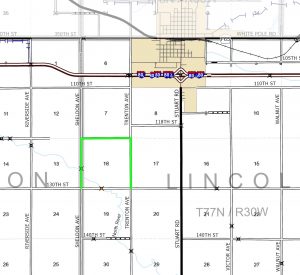DES MOINES, Iowa, January 10, 2022 – Iowa agricultural operations have been significantly impacted by recent tornadoes and severe storms that occurred in early December 2021. The U.S. Department of Agriculture (USDA) has technical and financial assistance available to help farmers and livestock producers recover. Robert Bonnie, Under Secretary for Farm Production and Conservation (FPAC), said Monday (today), “Production agriculture is vital to Iowa’s economy, and USDA stands ready to assist in the recovery from tornadoes and severe weather. USDA employees are working diligently to deliver USDA’s extensive portfolio of disaster assistance programs and services to all impacted agricultural producers.”
USDA Disaster Assistance
Producers who experience livestock deaths may be eligible for the Livestock Indemnity Program (LIP). Livestock producers who are contract growers – poultry and swine, for example – should work closely with their local Farm Service Agency (FSA) office to determine LIP eligibility. Meanwhile, the Emergency Assistance for Livestock, Honeybees, and Farm-Raised Fish Program (ELAP) provides eligible producers with compensation for feed and grazing losses. For ELAP, producers will need to file a notice of loss within 30 days; notices of honeybee losses must be filed within 15 days.
Additionally, eligible orchardists and nursery tree growers may be eligible for cost-share assistance through the Tree Assistance Program (TAP) to replant or rehabilitate eligible trees, bushes or vines lost. This complements Noninsured Crop Disaster Assistance Program (NAP) or crop insurance coverage, which covers the crop but not the plants or trees in all cases. For TAP, a program application must be filed within 90 days. “It is imperative that producers reach out to their local FSA office to report all crop, livestock and farm infrastructure damages and losses as soon as possible,” said Matt Russell, state executive director for the FSA in Iowa. “To expedite FSA disaster assistance, you will likely need to provide documents, such as farm records, livestock inventory, receipts and pictures of damages or losses.”
FSA also offers a variety of direct and guaranteed farm loans, including operating and emergency farm loans, to producers unable to secure commercial financing. Producers in counties with a primary or contiguous disaster designation may be eligible for low-interest emergency loans to help them recover from production and physical losses. Loans can help producers replace essential property, purchase inputs like livestock, equipment, feed and seed, cover family living expenses or refinance farm-related debts and other needs. Farm Storage Facility Loans are also available for producers needing to build, rebuild or upgrade facilities to store commodities.
Risk Management
Producers who have risk protection through Federal Crop Insurance or FSA’s NAP should report crop damage to their crop insurance agent or FSA office. If they have crop insurance, producers should report crop damage to their agent within 72 hours of damage discovery and follow up in writing within 15 days. For NAP covered crops, a Notice of Loss (CCC-576) must be filed within 15 days of the loss becoming apparent, except for hand-harvested crops, which should be reported within 72 hours. “Crop insurance and other USDA risk management options are there to help producers manage risk because we never know what nature has in store for the future,” said Pamela Stahlke, director of RMA’s regional office that covers Iowa. “The Approved Insurance Providers, loss adjusters and agents are experienced and well trained in handling these types of events.”
Conservation
The Emergency Conservation Program (ECP) and Emergency Forest Restoration Program (EFRP) can assist landowners and forest stewards with financial and technical assistance to restore fencing, damaged farmland or forests. ECP can also cover costs associated with hauling debris and its disposal. FSA is also considering other flexibilities for ECP and site inspections. USDA’s Natural Resources Conservation Service (NRCS) is always available to provide technical assistance in the recovery process by assisting producers to plan and implement conservation practices on farms, ranches and working forests impacted by natural disasters. The Environmental Quality Incentives Program (EQIP) can help producers plan and implement conservation practices on land impacted by natural disasters.
“NRCS can be a very valuable partner to help landowners with their recovery efforts,” said Jon Hubbert, state conservationist for NRCS in Iowa. “Our staff will work one-on-one with landowners to make assessments of the damages and develop approaches that focus on effective recovery of the land.”
Assistance for Communities
Additional NRCS programs include the Emergency Watershed Protection (EWP) program, which provides assistance to local government sponsors with the cost of addressing watershed impairments or hazards such as debris removal and streambank stabilization. Eligible sponsors include cities, counties, towns, or any federally recognized Native American tribe or tribal organization. Sponsors must submit a formal request (by mail or email) to the state conservationist for assistance within 60 days of the natural disaster occurrence or 60 days from the date when access to the sites become available. For more information, producers should contact their local NRCS office.
“EWP provides immediate assistance to communities to mitigate potential hazards to life and property resulting from disasters and particularly the severe erosion and flooding that can occur following severe weather,” Hubbert said. “We can work with a local sponsor to help a damaged watershed so that lives and property are protected while preventing further devastation in the community.”
More Information: On farmers.gov, the Disaster Assistance Discovery Tool, Disaster Assistance-at-a-Glance fact sheet, and Farm Loan Discovery Tool can help producers and landowners determine program or loan options. For assistance with a crop insurance claim, producers and landowners should contact their crop insurance agent. For FSA and NRCS programs, they should contact their local USDA Service Center, or call the FSA call center at 877-508-8364.






